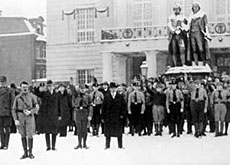William Tell – terrorist?

The Swiss national hero has been held up as a symbol of freedom in many countries besides Switzerland.
But many heads of state have seen him as a threat to their rule, and banned the play by Friedrich Schiller.
The story of William Tell ends when the archer kills the Habsburg bailiff. Was it murder or self defence?
While some see it as an act of justice, others interpret it as an assassination – a symbol of injustice.
“Tell is caught somewhere between a hero and murderer,” says Katharina Mommsen, a specialist in German literature.
The leaders of the French revolution of 1789 glamorised Tell as a freedom fighter. It was a perfect story to justify the revolt, and was therefore staged many times, which popularised the legend among the French.
In 1922, Belgian and French troops occupied Germany’s Rhineland and Ruhr regions. Their aim was to pressure the German government into making good on its reparation payments agreed three years earlier in the Treaty of Versailles.
Tell ban
The French occupying force imposed a ban on the Tell play in these German areas, worried it had the potential to instigate uprisings.
Even Hitler used the story of the Swiss hero to justify his political goals. After he assumed power in Germany, the Schiller work became a drama of national importance.
The National Socialists believed it embodied their beliefs and presented the correct image of a united people. They also saw in Tell a man with ideal leadership qualities.
The most popular scene among the Nazis depicts the swearing of the oath of allegiance on the Rütli meadow, which was the founding act of the Swiss confederation.
The text from this scene was often recited at public events and political demonstrations, as the Nazis believed it would help strengthen the political and spiritual unity of Germany.
Right qualities
Besides Tell, the Nazis presented Werner Stauffacher, the leader of the people of canton Schwyz, as a man possessing the right qualities.
“A distressed people should subordinate themselves with strict self-discipline to their natural ethnic leader, as the Swiss did to the prudent, visionary Stauffacher,” said the head of Nazi Germany’s propaganda ministry, Joseph Goebbels, twisting Schiller’s words.
After several assassination attempts on Hitler, including one by a Swiss man, Schiller’s work fell out of favour with the “Fuehrer”. Hitler took exception to the play’s glorification of the murder of the Habsburg overlord, Gessler.
It came as no surprise then when on June 3, 1941, the Nazi government banned the work.
From this moment on, the great drama ceased to exist for all intents and purposes in the homeland of its author. It was the only German classic the Nazis would ban.
Russian revolutionaries
Even Russian revolutionaries looked to William Tell for inspiration. The 19th century anarchist, Mikhail Bakunin, failed to prevent the extradition of Sergei Nechayev to imperial Russia from Switzerland.
Bakunin compared Nechayev, who was wanted for the murder of a fellow anarchist, to William Tell – “the hero of political assassinations”.
Tyrannicide did not disappear with the fall of Europe’s monarchies. It changed its name to terrorism.
Those that chose to fight the rule of oppressive government were quickly labelled “terrorists”, and the right to commit murder for political ends was once again questioned.
The Austrians have always considered William Tell a terrorist.
In the 1940s, the British administration in Palestine treated the Jewish underground leaders, Menachim Begin and Yitzhak Shamir, as terrorists, and yet both would eventually hold the post of Israeli prime minister.
In 1969, Palestinian extremists – called terrorists by the Israelis – fired on an Israeli passenger jet at Zurich airport, claiming they were acting in the spirit of William Tell.
The simple peasant from canton Uri has been reinvented many times over the centuries – sometimes as an apostle of freedom, other times as a terrorist.
swissinfo, Etienne Strebel
William Tell has been both praised and feared by states over the centuries, labelled either a hero or a terrorist.
The tyrannicide of previous centuries became known as terrorism in the 20th century.
A fine line separates the acts of a freedom fighter from those of a terrorist, and is a question of a person or government’s standpoint.

In compliance with the JTI standards
More: SWI swissinfo.ch certified by the Journalism Trust Initiative
You can find an overview of ongoing debates with our journalists here . Please join us!
If you want to start a conversation about a topic raised in this article or want to report factual errors, email us at english@swissinfo.ch.